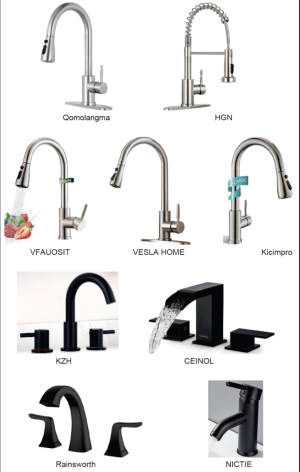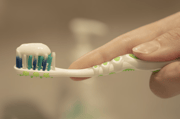Lead exposure concerns prompt faucet recall—what you need to know to stay safe
By
Veronica E.
- Replies 0
When it comes to home safety, clean drinking water is something most of us take for granted.
But a recent government recall of several widely available bathroom and kitchen faucets has raised new concerns about lead exposure in the home.
Independent testing revealed that certain faucets—many sold online at low prices—may be leaching unsafe levels of lead and other harmful substances into tap water.
For families, older adults, and caregivers of young children, this issue is a reminder of how important it is to verify product safety before installation.
If you’ve purchased or installed a faucet in recent years, here’s what you should know to help protect your health and your family’s well-being.

The US Consumer Product Safety Commission (CPSC) issued a recall of Chinese-made faucet models after tests showed they could release dangerous levels of lead and other chemicals.
These faucets were mainly sold online and may appear identical to trusted name-brand products, making them difficult for consumers to distinguish without proper certification markings.
Moen, a well-known faucet manufacturer, first noticed a sharp increase in suspicious low-cost lookalikes being sold on major e-commerce platforms.
The company hired the International Association of Plumbing and Mechanical Officials (IAPMO)—an accredited testing agency—to examine 19 of the top-selling inexpensive models.
Out of those 19 faucets, 17 failed to meet US drinking water safety standards.
The agency reported that 11 had lead levels above the federal limit, and 15 contained other substances not intended for human consumption.
The chemicals found included some linked to cancer as well as one typically used in lice and scabies treatments.
IAPMO officials stated that people who drink water with high levels of these contaminants could face increased health risks, including a higher chance of developing cancer over time.
Lead is a toxic metal that can have serious health consequences, especially for children, pregnant women, and older adults.
Even at low levels, lead exposure has been linked to developmental delays, learning difficulties, and behavioral problems in children.
In adults, long-term exposure can increase the risk of high blood pressure, kidney damage, and reproductive health issues.
What makes lead particularly concerning is that it often builds up in the body over time, and symptoms may not appear until the damage has already occurred.
Moen estimates that approximately 35 million low-cost faucets have been sold in the US over the last five years.
These faucets often retail for as little as $30 and may closely mimic well-known American brands in appearance.
According to Moen’s product team, some knockoff models copy every detail of their real products, right down to logos and markings.
During a recent Senate hearing, a Moen executive shared that a simple search for one of their valves returned one legitimate product and 41 counterfeits.
Even experienced plumbers would have difficulty telling them apart.
The recall has prompted concern in Congress.
Earlier this year, Senators Tammy Duckworth and Ted Budd sent a letter to the CPSC asking for tighter oversight of imported plumbing products.
Their request followed the testing data provided by IAPMO.
Speaking on the issue, Senator Duckworth emphasized that many consumers may not realize the risk these faucets pose and said stronger standards are needed to ensure that only safe products reach the market.
So far, Amazon—the main retailer where the recalled products were sold—has not issued a public comment.

If you're unsure whether your faucet is affected—or if you’ve recently installed a low-cost fixture—here are some steps to take:
For the full list of recalled models and additional product details, visit the official recall notice here.
As we age, our bodies may become more sensitive to environmental toxins.
Many older adults also care for grandchildren or host young family members in their homes.
Making sure your water is safe to drink is an easy and meaningful way to protect your health and theirs.
Read next: Want a longer battery life? Try these tricks that you never knew existed!

Have you checked your faucets for safety certification? Do you use a water filter in your home? Share your experiences and advice in the comments—your insight may help others in our community make safer, more informed decisions.
But a recent government recall of several widely available bathroom and kitchen faucets has raised new concerns about lead exposure in the home.
Independent testing revealed that certain faucets—many sold online at low prices—may be leaching unsafe levels of lead and other harmful substances into tap water.
For families, older adults, and caregivers of young children, this issue is a reminder of how important it is to verify product safety before installation.
If you’ve purchased or installed a faucet in recent years, here’s what you should know to help protect your health and your family’s well-being.

Some recalled faucets—many sold online and made overseas—have been linked to unsafe lead levels in household drinking water. Image Source: Pexels / Nithin PA.
Why the recall happened
The US Consumer Product Safety Commission (CPSC) issued a recall of Chinese-made faucet models after tests showed they could release dangerous levels of lead and other chemicals.
These faucets were mainly sold online and may appear identical to trusted name-brand products, making them difficult for consumers to distinguish without proper certification markings.
Moen, a well-known faucet manufacturer, first noticed a sharp increase in suspicious low-cost lookalikes being sold on major e-commerce platforms.
The company hired the International Association of Plumbing and Mechanical Officials (IAPMO)—an accredited testing agency—to examine 19 of the top-selling inexpensive models.
Out of those 19 faucets, 17 failed to meet US drinking water safety standards.
The agency reported that 11 had lead levels above the federal limit, and 15 contained other substances not intended for human consumption.
The chemicals found included some linked to cancer as well as one typically used in lice and scabies treatments.
IAPMO officials stated that people who drink water with high levels of these contaminants could face increased health risks, including a higher chance of developing cancer over time.
Also read: Could your tap water be changing? What’s happening with fluoride in Florida could spread
Why lead in water is so dangerous
Lead is a toxic metal that can have serious health consequences, especially for children, pregnant women, and older adults.
Even at low levels, lead exposure has been linked to developmental delays, learning difficulties, and behavioral problems in children.
In adults, long-term exposure can increase the risk of high blood pressure, kidney damage, and reproductive health issues.
What makes lead particularly concerning is that it often builds up in the body over time, and symptoms may not appear until the damage has already occurred.
Also read: Are you at risk? This chemical in your drinking water could increase your cancer risk by up to 33%!
The scope of the issue
Moen estimates that approximately 35 million low-cost faucets have been sold in the US over the last five years.
These faucets often retail for as little as $30 and may closely mimic well-known American brands in appearance.
According to Moen’s product team, some knockoff models copy every detail of their real products, right down to logos and markings.
During a recent Senate hearing, a Moen executive shared that a simple search for one of their valves returned one legitimate product and 41 counterfeits.
Even experienced plumbers would have difficulty telling them apart.
Lawmakers respond
The recall has prompted concern in Congress.
Earlier this year, Senators Tammy Duckworth and Ted Budd sent a letter to the CPSC asking for tighter oversight of imported plumbing products.
Their request followed the testing data provided by IAPMO.
Speaking on the issue, Senator Duckworth emphasized that many consumers may not realize the risk these faucets pose and said stronger standards are needed to ensure that only safe products reach the market.
So far, Amazon—the main retailer where the recalled products were sold—has not issued a public comment.

These are the recalled faucet models identified in a federal safety alert for containing unsafe levels of lead and other contaminants. Image Source: United States Consumer Product Safety Commission.
Also read: New study reveals surprising truth about tap versus bottled water
What you can do now
If you're unsure whether your faucet is affected—or if you’ve recently installed a low-cost fixture—here are some steps to take:
- Stop using the faucet for drinking or cooking. If necessary, run the water for at least 15 seconds before use to help flush out any contaminants.
- Check for certification marks. Look for logos from IAPMO, NSF, or the Water Quality Association. These marks show that the product meets US safety standards. You can also verify certification online or by contacting the agency.
- Consider using a certified water filter. A good filter can help reduce lead and other harmful substances but should only be a temporary measure.
- Replace questionable faucets. Choose new fixtures from recognized brands and consult a licensed plumber if you’re unsure what to buy.
For the full list of recalled models and additional product details, visit the official recall notice here.
Tips for safe faucet shopping
- Shop with trusted retailers or directly from brand websites
- Choose faucets that meet NSF/ANSI Standard 61, which outlines safety requirements and limits for lead and other potential contaminants.
- Be cautious of very low prices or unknown brand names
- Read verified reviews and check for detailed customer photos
- Reach out to the brand or retailer if you have concerns
As we age, our bodies may become more sensitive to environmental toxins.
Many older adults also care for grandchildren or host young family members in their homes.
Making sure your water is safe to drink is an easy and meaningful way to protect your health and theirs.
Read next: Want a longer battery life? Try these tricks that you never knew existed!
Key Takeaways
- The US government has issued a recall of faucet models that may release lead and other harmful chemicals into drinking water.
- Testing by IAPMO found that 17 of 19 faucets failed to meet US safety standards—11 due to lead and 15 due to unsafe organic compounds.
- Lead exposure poses serious health risks, especially to children, pregnant women, and older adults.
- Consumers are urged to check for proper certifications, use filters if needed, and replace questionable faucets with verified products.
Have you checked your faucets for safety certification? Do you use a water filter in your home? Share your experiences and advice in the comments—your insight may help others in our community make safer, more informed decisions.






